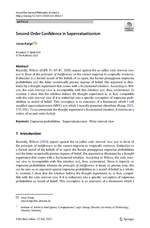Second-order Confidence in Supervaluationism
From International Center for Computational Logic
Second-order Confidence in Supervaluationism
Jonas KargeJonas Karge
Jonas Karge
Second-order Confidence in Supervaluationism
Journal for General Philosophy of Science, July 2023
Second-order Confidence in Supervaluationism
Journal for General Philosophy of Science, July 2023
- KurzfassungAbstract
Recently, Wilcox (2020) argued against the so-called wide interval view and in favor of the principle of indifference as the correct response to unspecific evidence. Embedded in a formal model of the beliefs of an agent, the former presupposes imprecise probabilities and the latter numerically precise degrees of belief. His argument is illustrated by a thought experiment that comes with a fundamental intuition. According to Wilcox, the wide interval view is incompatible with this intuition and, thus, undermined. In contrast, I show that the intuition behind the thought experiment is, in fact, compatible with the wide interval view if it is embedded into a specific conception of imprecise probabilities as model of belief. This conception is an extension of a framework which I call modified supervaluationism (MSV) and which I recently presented elsewhere Karge (2021). To accommodate the thought experiment’s fundamental intuition, it introduces a notion of second-order beliefs. - Projekt:Project: ScaDS.AI
- Forschungsgruppe:Research Group: Computational LogicComputational Logic
@article{K2023,
author = {Jonas Karge},
title = {Second-order Confidence in Supervaluationism},
journal = {Journal for General Philosophy of Science},
publisher = {Springer},
year = {2023},
month = {July},
doi = {https://doi.org/10.1007/s10838-023-09652-7}
}
